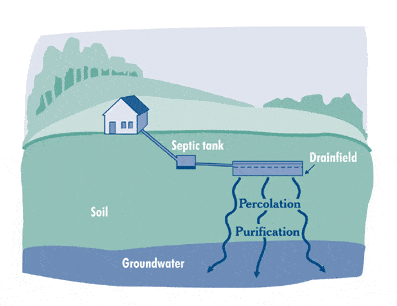Disclosure: This post contains affiliate links, meaning we may earn money or products from the companies mentioned in this post if you purchase a product through one of our links. An example would be Amazon.
Are Septic Tank Filters Necessary?
Are Septic Tank Filters Necessary? That is exactly what we will cover in this article.
Your septic tank is either a large concrete or plastic container that is installed underground for the purpose of holding and treating wastewater that flows from your home or facility. From there, the wastewater travels to the drainfield (or leach field) as contaminants or toxic matter is removed. A septic tank filter (or effluent filter) is a slotted cylindrical device fitted into a vertical outlet pipe attached to the septic tank. An effluent filter is designed specifically to prevent solid wastes in your septic tank from making their way onto the drainfield.
Are septic tank filters necessary? Ideally, the only thing that should end up in the drainfield is wastewater. Realistically, though, it is not impossible for hair, grit, or even solid waste sewage to make their way from your septic tank and to your drainfield area. This is why it is necessary for every septic tank system to have an outlet filter.
Wastewater that flows from your home or establishment and into your septic system carries solid waste matter. As these solid wastes decompose in the septic tank, it settles at the bottom, forming a layer of sludge. Lighter solid materials form what is referred to as a scum layer. When a septic tank fills up, liquid waste will reach a level where it will flow out of the septic tank through a piece of pipe attached to the outlet hole. While the material exiting the septic tank is liquid, for the most part, it cannot be helped that solid waste moves through the pipe, as well.
Septic tanks are best fitted with an effluent filter, also known as tank outlet filter. This is installed in the outlet of the septic tank and is a huge help in preventing solid waste from getting into the leach field along with the treated wastewater. These solid waste materials may even clog up your septic tank’s outlet pipe. In fact, local government units actually mandate outlet filters in some jurisdictions. But even if your local government does not require outlet filters in your area, you should seriously consider attaching one as they help avoid clogging in your leach field. This can cause flooding and even the failure of your entire leach field system, not yet counting the significant health risks for those living within the vicinity. A clogged leach field possibly results to the contamination of nearby plants, as well.
Septic tank filters are a very affordable means to improve the efficiency of your septic tank system and even extend its lifespan. They can help prevent home and business owners from incurring costly repairs due to failed septic systems. On average, a septic system failure can cost you on the upwards of $25,000.00. Frightful, I know.
Septic tank filters are easily installed into existing septic tanks. However, as with your septic tank as a whole, septic tank filters do require maintenance, too. Septic tank filters require regular cleaning to avoid irreversible clogging. Build-up of solid waste in your septic tank filter simply means it is doing its job. But you would not want this to permanently jam up your entire septic system. The effluent filter is made of slotted plastic, which allows liquid to pass through. These slots, however, are small enough so that larger solid particles will not make it through. If too much solid matter exits through the outlet of the septic tank, there is a higher chance for your leach field to become clogged, which, in turn, could result in a failed system.
The effects of a failed leach field can possibly be expansive and have significant implications on the health of every living creature in the area. A failed leach field poses serious health concerns all around. Not only because disease-causing bacteria are released into the ground, but also because water can be contaminated and infect the plants that grow in that vicinity. Both humans and animals all become susceptible to contracting serious infections caused by the bacteria emanating from a failed septic leach field.
How Often Should the Septic Tank Outlet Filter Be Cleaned?
Septic tank filters should be cleaned as soon as you notice slow or sluggish drains or a gurgling sound at every drain in your house or facility. It is recommended that you also get your effluent filter cleaned at least every time you get your septic tank pumped. However, keep in mind that more frequent cleanings for the effluent filter may be required. Each septic system is unique, and the frequency of maintenance varies, specific to a particular septic system.
After all, septic tanks need to be pumped regularly and periodically in order to remove the sludge and scum that are not broken down as quickly with the typical digestive process in the septic tank. Include your septic tank filter in this routine. Normally, your septic tank filter will function for several years before cleaning is actually required. At a minimum, your septic tank filter should be cleaned whenever the tank is pumped, or at least every 3 to 5 years.
Without regular and proper maintenance of your septic tank outlet filter, sewage could back up into your home or facility. Sluggish drains and gurgling noises coming from your plumbing system are high indicators that your septic tank needs a thorough cleaning and routine maintenance. It is always best to contact a trained septic system professional to install a new filter, replace, or clean out your current unit.
How to Clean a Septic Tank Filter
If you have decided to clean your effluent filter yourself, be sure to dress properly for the task: wear full-length pants and a long-sleeved shirt, water-resistant and heavy-duty shoes or boots, gloves, and work goggles are minimum requirements.
Remove the access lid of your septic tank. If the lid to your septic tank is above ground, you should be able to spot it easily. However, if it is buried underground, make sure you are aware of the measurements or dimensions and the location of your tank lid (or lids) first. If you do not have this information readily available to you, get in touch with your county health department and they should be able to assist you in locating your septic system’s access lid.
Remove the filter cartridge by lifting it out of the septic vault. Hold the effluent filter over the open port of the septic tank so the effluent runs back into the tank. With a hose, lightly spray the cartridge tubes with water to remove solid material stuck on the insides.
Inspect the vent hole and other orifices. Spray them with water to clear off any debris, and then replace the filter cartridge. Make sure to firmly replace the cartridge back securely into the saddle holes at the top of the cartridge vault. Clean up the area of any spillage. Immediately change your clothes and wash and sanitize your hands after the task.
Some effluent filters are built with an alarm that is activated when the filter requires cleaning. If what you have is one of these models, you need to ensure that the alarm is actually functional by lifting the float switch so the alarm will sound off. If your effluent filter doesn’t come equipped with an alarm system and you would like one, contact your local septic system installer.
How to Keep Your Septic Tank Clean
To extend the lifespan of your septic system, the basic rules of thumb would be to effect regular maintenance and be mindful of your total water consumption. A clean and well-maintained septic tank will surely help save you considerable money down the line.
Pump out your septic tank regularly. Do not wait for septic system emergencies before having it pumped. Routine pumping prevents failures in your septic system.
Keep accurate records of your septic system. Keep a diagram of your septic system’s location and track system maintenance. Have this information readily available in the house (or facility).
Be mindful of your water consumption. Simply put, smart water consumption results to more manageable wastewater production. High volume of wastewater causes strain on your septic system. This way, you likewise prolong the life of your drainfield as you diminish the possibility of system failures.
Contract a certified septic technician for septic system issues. Cleaning, draining, and pumping your septic tank system are best accomplished by certified septic system professionals. The job entails equipment, specialized skills, and the consequences of potential mishaps are suitably handled by experts.
No doubt about it, septic tank systems play a crucial role in any and every establishment, be it your business or your own home. Every time anybody runs the tap, flushes the toilet or does the laundry, your septic tank system comes to action. Water (and the waste it carries) has to efficiently travel out of your facility and into what is hopefully a robust and properly-conditioned septic tank and well-maintained drainfield. Regular maintenance of the whole septic system is perhaps one of the best investments a home or business owner can make for their property. Routine and religious maintenance will save you from the inconvenience and worry of expensive emergency repairs.
[us_map]
Related Septic Tank Filter Resources
https://www.wrenvironmental.com/septic-tank-outlet-filter/
https://www.saviourseptic.com/need-effluent-filter-septic-system/
https://www.flohawks.com/blog/how-often-should-the-septic-tank-outlet-filter-be-cleaned/
https://branchburg.nj.us/HOW_TO_CLEAN_A_SEPTIC_EFFLUENT_FILTER.pdf


